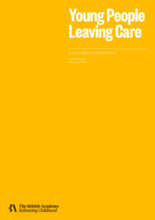

Displaying 701 - 710 of 1653
This chapter from the book Education in Out-of-Home Care reviews available evidence, drawing on a recent small-scale English research study to explore the potential of early education as an intervention for children in care.
This chapter from the book Education in Out-of-Home Care presents findings from a study of the educational progress of Out of Home Care (OHC) children in England.
This chapter from Education in Out-of-Home Care describes part of a project in England where the concept of Caring Schools was developed, with four domains: ethos and leadership, child focused practice, relationships with parents and carers, and interagency working.
The aim of this study is to examine mental ill-health amongst children known to social services based on care exposure including those who remain at home, those placed in foster care, kinship care or institutional care and the general population not known to social services.
"Thousands of children in care whose immigration status will be affected by Brexit could find themselves in the UK unlawfully, facing homelessness, immigration detention or deportation, an immigration legal charity has said," says this article from the Guardian.
Join this webinar to walk through the PROMISE Child Participation Tool and to discuss approaches and considerations for soliciting children’s views on their Barnahus experience.
Despite guidelines in place to prevent it, children's care homes in the UK continue to use the police as a “respite service," and children in residential care homes are 10 times more likely to be criminalised than other children, according to this article from the Guardian.
This article reports on the analysis of 11 qualitative interviews with parents who had attended child protection case conferences (CPCCs) in Scotland.
According to this article from BBC News, "children over the age of 16, often in care or formerly so, are increasingly being placed in unregulated homes in England and Wales," putting them at increased risk of exploitation and abuse.
This case study seeks to summarise the policy priorities of the four UK nations for care leavers, review outcomes for which data is publicly available, and discuss a number of areas where policy differences can be identified.

